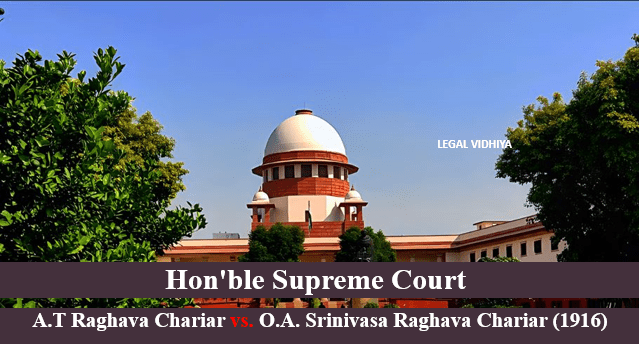
| Citation | (1916) 31 MLJ 575 |
| Date of Judgment | 5 April, 1916 |
| Court | Supreme Court of India |
| Case Type | S.A. No. 1366 of 1914 |
| Appellant | A.T Raghava Chariar |
| Respondent | O.A. Srinivasa Raghava Chariar |
| Bench | Madras High Court Bench Abdur Rahim, O.C.J |
| Referred | Section-Transfer of Property Act, 1882), Sections 6(h)(3), 7 & 58 – Contract Act, 1872 (9 of 1872), Section 11, 2(g), 19, 64 & 65 |
FACTS OF THE CASE
- The plaintiff (minor) entered into a mortgage with the defendant who is major on 23rd March 1903.
- The mortgagor gave the whole money against the security that was to be mortgaged , but at the time of mortgage the mortgagee (Plaintiff)was an infant. The Plaintiff performed his part of obligations and extended a monetary amount to the defendant.
- Although, plaintiff performed his obligations, the defendant refused to honour the agreement. The suit has been brought for the recovery of the sum of Rs 1100 and odd due on the mortgage.
(The case is an appeal against the decree of the District Court , of Chingleput )
ISSUES:
1) Whether a mortgage executed in favor of a minor who has advanced the whole of the mortgage money is enforceable by him or by any other person on his behalf?
ARGUMENTS
- As per the Sections 2(g), 19, 64 & 65 of Contract Act, 1872 (9 of 1872) – Sale to minor is voidable. If the infant chooses to avoid sale in his favor, transaction will be void ab initio. Minor is entitled to recover money which he paid to the vendor as consideration on condition that property is restored to the vendor.
- Minor being a promise in the above case thus nothing in contract Act prevents infant from being promise, empowering him to enforce promise of adult promisor, where consideration passes to third (major) party or ‘competent’ consideration passes from minor. On the contrary, if consideration for promise is transfer of property by minor, promise would be unenforceable.
- As mentioned in Section 7 of Transfer of Property Act, 1882 (4 of 1882),
Section 7 of T.P. Act neither declare that transfer by person incapable of contracting is wholly void nor does it prohibit it. Thus, an interpretation can be made that persons who are incapable of contracting, are capable of transferring. - A mortgage is however is only a conditional transfer’, and when the condition is fulfilled (as when the debt is discharged) the property revests in the transferor. Though the minor cannot enter into a contract and provide his consent as such contracts would be void but the act does not preclude him been the promisee because the requirement of competence is only required for promisor.
- (Respondent)1
The age of majority has been decided by Indian Majority Act of 1875. As per the Indian Contract Act of 1872, minors are incompetent to hold any form of contract. Also, an agreement made by a minor is completely void.
JUDGEMENT / Held
- The mortgagor, a major has to repay the money advanced to by the mortgagee as the agreement sought to be enforced is the promise of the mortgagor.
- The mortgagee (the minor) has already advanced the money which was the consideration for the promise of the mortgagor and performed his part of the obligations which is nothing but the consideration of the promise of the mortgagor. There is nothing pending from his side.
- Hence, the contract is enforceable.
CURRENT DAY SIGNIFICANCE
The case law holds a lot of significance as it helped in widening the scope of providing protection to minors in the contracts, empowering the minors to make a contract, like mortgage where the minor has completed all the obligations on his side.
This was limited in the case of Mohiri Bibee vs Dharmodas Ghose, where
An appeal was then made to the Privy council. The Privy council held that-
- A contract with a minor is void-ab-initio.
- Sec.7 of the Transfer of Property Act, 1882 states that a person competent to contract is competent to transfer a property.
- Hence, the mortgage executed by the respondent is void.
However, if a minor enters into a contract and performs his part of obligations, the other party can be compelled to perform and fulfill its obligations, and, in such instances, the contract becomes legally enforceable.
Thus, this decision would allow minors to enter into contracts while giving them the protection, thereby avoiding the harshness of Mohiri Bibee. But this solution had its shortcomings. It excluded from its scope, contracts where the consideration on behalf of the minor was only part-performed or partly-executed. Such contracts were deemed to not create any rights in favor of the minor because the liability of the minor under the contract remained the same.
REFERENCES
https://thelawexpress.com
https://www.tnsja.tn.gov.in/
This Article is written by Riyansh Gupta of University Institute of Legal Studies, Intern at Legal Vidhiya.




0 Comments